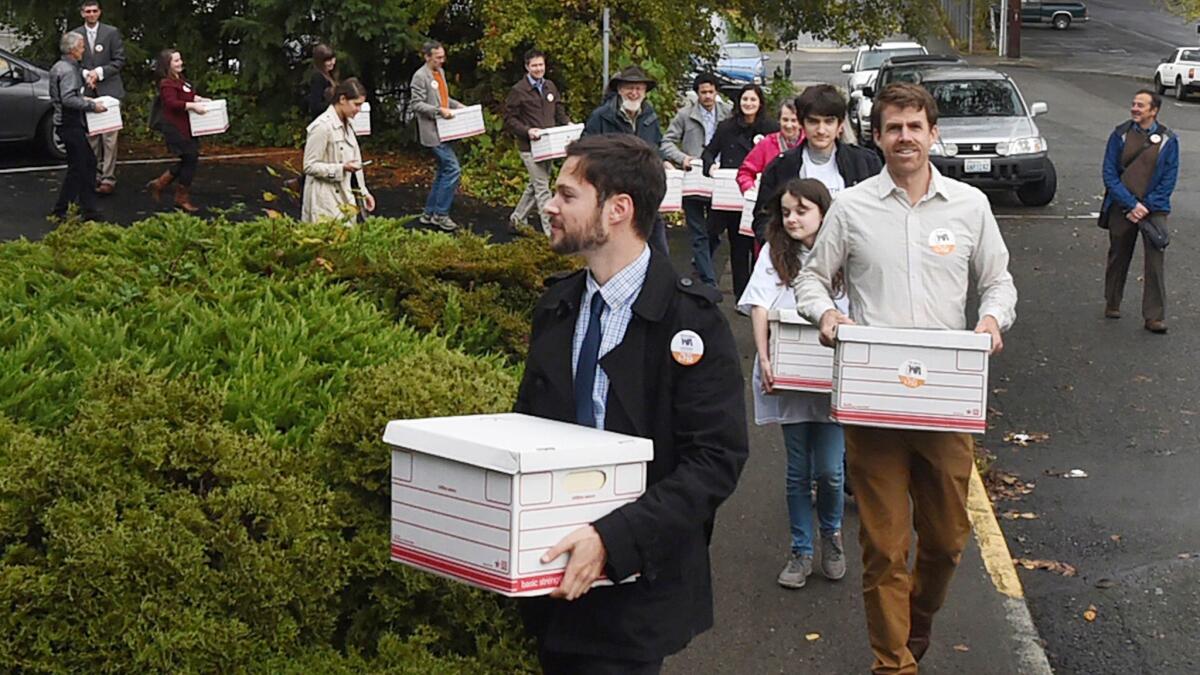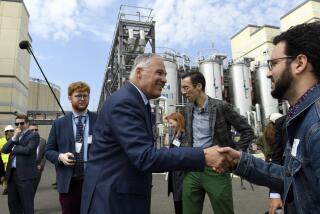Op-Ed: Why are environmental groups lining up against Washington’s carbon tax initiative?

- Share via
Imagine a tax proposal so unusual that it turns traditional political alliances inside out: a tax hike on fossil fuels that liberals and green groups oppose, while a key petroleum trade group remains neutral — even though the tax is aimed at its products. Such a proposal, you’d think, could only be the product of a diabolical mind.
Sort of: the plan’s author, Yoram Bauman, is known as the “stand-up economist.” When he’s not teaching at the University of Washington, Bauman travels the country doing economics-based comedy. An example: “Microeconomists are economists who are wrong about specific things. Macroeconomists are economists who are wrong about things in general.”
Yet Bauman is serious about Washington State Initiative 732, which will appear on the ballot this November thanks to the work of a group that he helped assemble. If it passes, it will impose a carbon tax on fossil fuels in Washington but reduce general taxes by about the same amount — cutting the state’s sales tax by 1 percentage point, boosting Washington’s tax credit for low-income families and trimming business taxes on manufacturers. It’s designed to bring down consumption of carbon-based fuels in a revenue-neutral way without putting any additional financial burden on state residents.
Our current approach to taxation doesn’t make sense. We tax things that we want more of ... and wind up getting less of those things.
Behind the proposal is Bauman’s notion that our current approach to taxation doesn’t make sense. We tax things that we want more of, like profits and income, and wind up getting less of those things because taxation tends to make them more scarce. Instead, we should tax things that we want less of — and, for Bauman, that means taxing fossil fuels to reduce greenhouse gas emissions.
From a traditional economics perspective, Initiative 732 isn’t outrageous at all. The early-20th-century English economist Arthur Pigou argued that the actions of individuals and firms sometimes impose costs on society — such as the sale of alcoholic beverages, which require employing more cops to deal with the resulting disorder. That cost, in Pigou’s mind, justifies an extra government levy on alcohol, an example of what’s come to be known as a Pigovian tax.
It’s from a political perspective that Bauman’s proposal is causing a stir, discomfiting green advocates who are used to big government interventions and are frankly suspicious of a revenue-neutral solution.
The Sierra Club has adopted a “do not support” position because Initiative 732 will not increase “investment in green jobs, energy efficiency, transit, housing, and renewable energy.”
The progressive-minded Washington Environmental Council is similarly unenthusiastic about a tax that doesn’t grow government. And the climate-justice organization OneAmerica is backing an alternative tax that would generate new state revenues. The group’s director says that its proposal — not on the ballot this year — would “take on entrenched fossil-fuel interests,” as if Initiative 732 did not.
The Washington State Democratic Party also opposes the tax, in part because of what it decries as “ridiculous commentary” by Bauman. Earlier this year, in a message to environmentalists, Bauman argued that “the path to climate action is through the Republican Party.” He believes that the GOP’s skepticism on climate change is surmountable. “The same cannot be said of the challenges on the left: an unyielding desire to tie everything to bigger government, and a willingness to use race and class as political weapons in order to pursue that desire,” he said.
In fact, the one tax already in effect that most resembles Initiative 732 is an emissions levy passed in British Columbia in 2008 not by the left but by a center-right government.
Some business groups also oppose the measure, reasoning that any tax package creates winners and losers. This tax will raise the cost of gasoline and electricity but cut the sales tax and some corporate taxes. Figuring out how that will affect the bottom line is a complex calculation, and some businesses would rather not take the risk that such a change in policy involves.
But a key trade organization, the Sacramento-based Western States Petroleum Assn., which represents producers and distributors of energy on the West Coast, has declined to oppose the initiative, even though it has challenged other carbon energy mandates. The group hasn’t explained its position, a spokesman merely telling the Seattle Times, “We don’t support it and we don’t oppose it.”
Even without the backing of major business groups or the Democratic Party, the effort to pass the initiative has collected nearly $1.5 million in contributions, largely from individuals in a state considered among the nation’s most eco-friendly.
Most politics these days seems a case of familiar coalitions battling over familiar policy issues framed in predictable legislative solutions. Initiative 732 turns all that on its head.
Steve Malanga is senior editor at the Manhattan Institute’s City Journal, from which this essay was adapted.
Follow the Opinion section on Twitter @latimesopinion and Facebook
More to Read
A cure for the common opinion
Get thought-provoking perspectives with our weekly newsletter.
You may occasionally receive promotional content from the Los Angeles Times.










